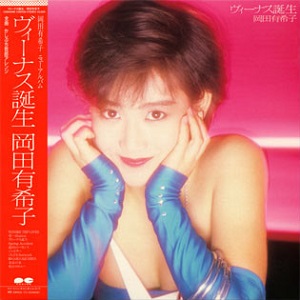
|
All songs arranged by Tetsurou Kashibuchi |
Venus TanjouLP, Cassette, CD: 1986-03-21 UHQCD: 2015-09-16 Bonus Tracks (2015 Release): Koi no Etude |
Review:
Venus Tanjou is the most ambitious of Yukiko’s albums, and a tantalizing look into what could have been. The title Venus Tanjou, or Birth of Venus brings to mind an adult woman, the goddess of love. On the cover, Yukiko wears red lipstick and looks up, almost seductively, in a revealing dress. The message is clear – this is yet another maturation of Yukiko’s image. No longer is she the little sister character, or girl next door. While the last album leaned fantasy, this album is firmly within the science fiction genre. The music is pure Techno Kayo, and every track is drowning in the sounds of synthesisers. If you don’t like this kind of music, you’re flat out of luck.
The composers brought on to work on this album are largely more niche or more independent artists. Gone are idol album mainstays like Masataka Matsutouya and Kouji Makaino. In their place are city-pop artist Taeko Ohnuki and Fanti, a little-known techno duo whose music carries clear city pop influences. The album’s biggest draw is Ryuuichi Sakamoto, a truly monumental figure in Japanese music, and electronic music as a whole. Wonder Trip Lover is a truly great album opener. Unusual for an idol album, Yukiko herself almost disappears amongst the overwhelming sound of claps, drums and saxophones. I love this song. It perfectly sets out the sense of awe, and the futuristic mood of the album. Yukiko is confident, and her maturity is evident. Another personal favourite of mine is Jupiter. Tetsrou Kashibuki normally prefers a more sparse arrangement, and seeing him write something so loud and energetic is unusual. I would have liked to have seen him write more songs like this for Yukiko.
One criticism I will make is that this album is low on the kinds of catchy pop songs Mariya Takeuchi or Tetsuya Komuro would write. As with Cinderella, I admire this album’s ambition, but that doesn’t always translate to good songs. I think some of the tracks are fairly weak, such as Spring Accident and Ginga no Vancances. If you can look past this though, you’ll find one of the most fascinating, most experimental idol albums of the 1980s.
Favourite Track (Non-Single): Wonder Trip Lover
Least Favourite: Ginga no Vacances